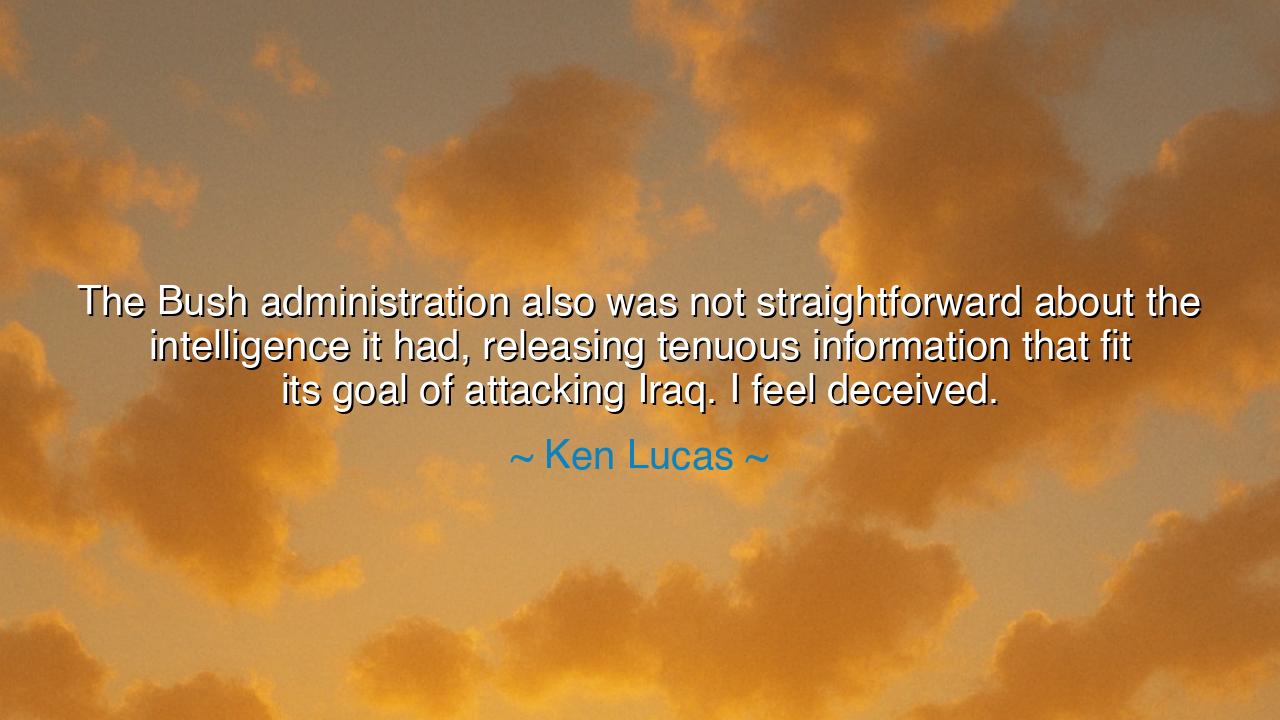
The Bush administration also was not straightforward about the
The Bush administration also was not straightforward about the intelligence it had, releasing tenuous information that fit its goal of attacking Iraq. I feel deceived.






Here is a deeply emotional and ancient-style reflection on Ken Lucas’s quote:
The Shadow of Deception
When Ken Lucas declared, “The Bush administration also was not straightforward about the intelligence it had, releasing tenuous information that fit its goal of attacking Iraq. I feel deceived,” he spoke with the ache of one who has witnessed truth betrayed by power. His words carry not only political disappointment, but a universal sorrow — the timeless pain of betrayed trust. For in every age, when leaders cloak falsehood in the garments of truth, the soul of a nation trembles.
In his confession — “I feel deceived” — lies the cry of the honest citizen, the man who believed in the integrity of governance and found instead the labyrinth of manipulation. It is the ancient tragedy reborn: when those entrusted with light choose to walk in shadow. Lucas’s statement does not merely condemn one administration; it illuminates the eternal tension between truth and ambition, between those who serve justice and those who serve desire.
The origin of his words lies in a time of war and confusion — the early years of the twenty-first century, when fear ruled and information became weapon. The invasion of Iraq was justified by claims of weapons unseen, dangers unproven, and intelligence that bent beneath the weight of political will. Lucas, like many, discovered too late that certainty had been forged from conjecture, and that noble words had been used to veil darker motives. Yet this is not the first time in history that truth has been sacrificed upon the altar of expedience.
Recall the tale of Julius Caesar, who crossed the Rubicon not in defense of Rome’s law, but under the pretense of protecting it. His intelligence, his reports, his justifications — all cloaked ambition beneath rhetoric. And Rome, persuaded by his confidence, followed him into the death of its republic. So too in every era do leaders twist fragments of truth to fit their ends, and so too do nations awaken, too late, to the echo of deception.
But Lucas’s lament also holds a deeper teaching — for truth, once betrayed, demands not despair but awakening. To feel deceived is painful; to remain silent after the deception is fatal. His words remind us that democracy, like the human spirit, can survive betrayal only if it learns to question again. The wise citizen must not trust blindly, for even good intentions can be corrupted by pride. The measure of a people’s freedom is not how fervently they believe their leaders, but how fearlessly they seek the truth behind them.
Yet there is compassion, too, in his tone — a recognition that deception often begins in fear. Leaders who fear weakness reach for illusion. They wrap uncertainty in the armor of confidence, convincing themselves that the end justifies the means. But truth is not clay to be molded by ambition; it is granite, unmoving, sacred. To bend it is to fracture it, and those fractures spread through nations until the whole foundation begins to crumble. The cost of deceit is not measured in battles won or lost, but in the trust that withers in the hearts of a people.
Therefore, O listener of later times, remember this: truth is the lifeblood of a civilization. Guard it as a sacred trust. When rulers speak, listen — but also question. When power presents certainty, seek the evidence beneath it. Do not mistake eloquence for honesty, nor conviction for clarity. For as long as men are fallible, so too will deception dwell among them — but the vigilant mind, the informed heart, is the sword that keeps it at bay.
And when you, like Ken Lucas, feel deceived, let your pain become your wisdom. Let it sharpen your discernment and deepen your compassion. For in the end, the only cure for falsehood is the courage to seek the truth yourself, and the strength to speak it, even when it is unwelcome. Then, and only then, will the light of honesty outshine the shadows of power.






AAdministratorAdministrator
Welcome, honored guests. Please leave a comment, we will respond soon